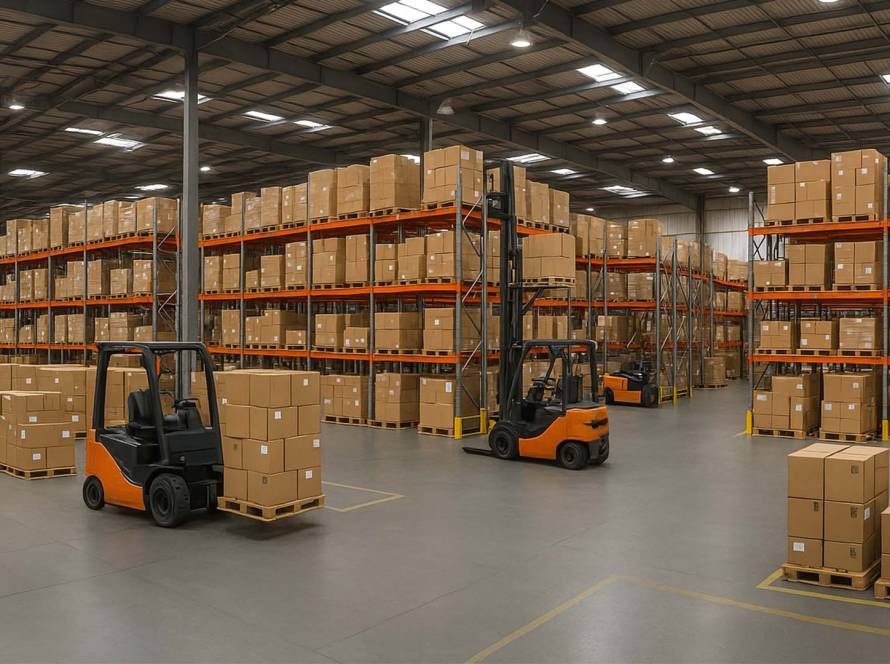Warehouse floor inspections before leasing are routine procedures and essential steps in optimizing logistics operations, protecting assets, and maintaining real estate value. As e-commerce and logistics expand, demand for high-quality warehouses increases, accompanied by stricter operational standards.

The Importance of Warehouse Floor Inspection Before Leasing:
For tenants, a high-standard warehouse floor optimizes operational efficiency, ensuring the safety of goods, equipment, and employees. A flat warehouse floor allows forklifts and transport equipment to move smoothly, reducing wear and tear and potential damage caused by vibrations or uneven surfaces. This is particularly crucial for logistics, manufacturing, and retail businesses, where fast loading and unloading operations are essential. Furthermore, poor-quality flooring can damage goods, especially sensitive items like food, pharmaceuticals, or electronic components, leading to significant financial losses.
For investors, inspecting and ensuring floor quality before leasing minimizes potential disputes and claims. A substandard floor may result in expensive repairs if it settles, cracks, or deteriorates over time. Conversely, a high-standard warehouse floor increases the property’s value, attracts long-term tenants, and enhances the investor’s reputation and competitiveness in the market. Given the increasing competition in the warehousing sector, businesses with warehouses that meet international standards will have a greater advantage in attracting high-value tenants and maximizing space utilization.
Potential Risks of Not Inspecting Warehouse Floors:
- Impact on Workplace Safety: A substandard warehouse floor poses significant risks of workplace accidents. Issues such as settling, cracks, uneven surfaces, or slippery conditions increase the likelihood of forklift rollovers, employee falls, or structural instability.
- Reduced Operational Efficiency and Increased Costs: Uneven flooring disrupts the movement of forklifts and carts, slowing operations and reducing productivity. When transport equipment continuously vibrates on an uneven surface, its lifespan decreases, leading to higher maintenance and repair costs.
- Higher Maintenance and Repair Costs Over Time: If flooring issues are not detected and addressed early, investors and tenants may face substantial repair costs later. Small cracks can widen over time, leading to severe structural damage requiring complete floor replacement or extensive reinforcement.
- Impact on Product Quality and Work Environment: Deteriorating warehouse floors can generate dust, moisture, and other contaminants, increasing the risk of product damage—particularly for goods requiring strict storage conditions, such as food, pharmaceuticals, cosmetics, or electronics.

PCE Vietnam's Standard Warehouse Floor Inspection Process:
PCE Vietnam follows a rigorous warehouse floor inspection process based on international standards, ensuring tenants and investors have comprehensive information about floor conditions before signing a lease.
- Inspection of Construction Joints: Construction joints are prone to cracking and chipping due to concrete shrinkage and forklift impact. PCE Vietnam uses specialized measuring devices to assess the durability and adhesion of construction joints, recommending appropriate solutions to extend floor lifespan.
- Assessment of Floor Flatness: Warehouse floors must meet strict flatness requirements to ensure the stable operation of forklifts and equipment. PCE Vietnam employs advanced tools such as Profileograph, TR34 Software, and Dipstick to measure floor deviations and suggest corrective actions, if necessary, accurately.
- Wear Resistance Testing: The floor surface must withstand significant wear and tear over time. Using the BCA Abrasion Resistance Test, PCE Vietnam evaluates the concrete’s resistance to abrasion and recommends enhancements if needed.
- General Observation and Reporting: PCE Vietnam conducts a comprehensive inspection to detect cracks, settling, or other signs of deterioration. All findings are documented in detailed reports, including recommended corrective measures, enabling investors and tenants to make informed decisions.

Floor Inspection – A Key Factor in Sustainable Warehousing:
Warehouse floor inspections before leasing are routine procedures and essential steps in optimizing logistics operations, protecting assets, and maintaining real estate value. As e-commerce and logistics expand, demand for high-quality warehouses increases, accompanied by stricter operational standards.
With its expertise in flat floor inspection, PCE Vietnam is committed to providing accurate evaluations and practical solutions, helping investors and tenants mitigate risks and enhance warehouse performance. Investing in pre-lease floor inspections reduces future repair costs and ensures a safe, efficient, and sustainable working environment.


